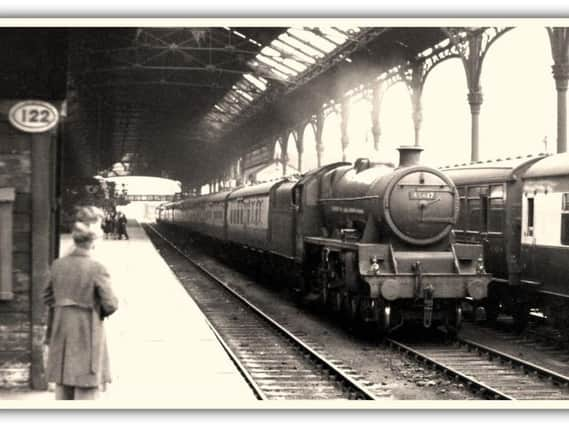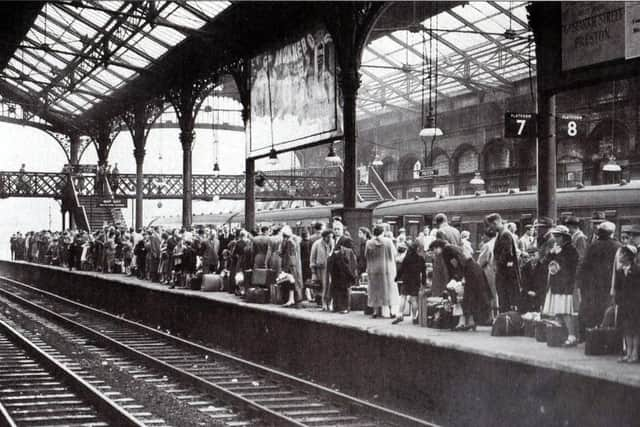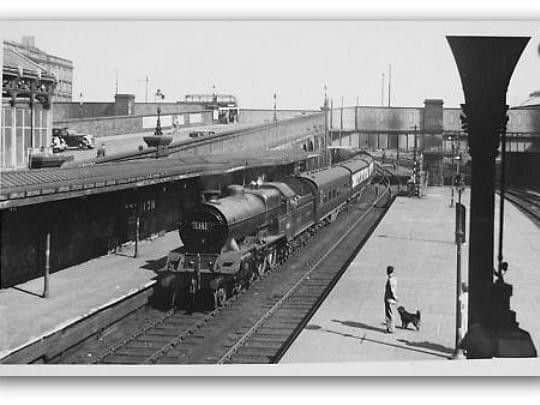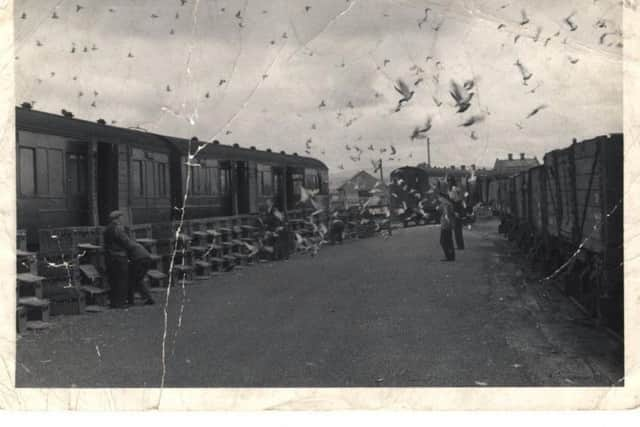My madcap summer job on Preston railway station


In the 1950s the university terms were about eight weeks, which meant we had very long vacations.
The summer one was about 16 weeks. Much of the summer term was spent planning great trips for the vacation or finding work. My father helped me find work at Preston Railway Station. I worked there for three summers.
Advertisement
Hide AdAdvertisement
Hide AdThe station took on many students as temporary workers to cover for staff holidays. There were three shifts – earlies, lates and nights. I received a letter telling me to report to the office at 2pm for the late shift. There was no induction, no training – I was simply allocated to a gang and had to learn on the job.


There was no love lost between many of the staff and the students whom they regarded as from another planet. Many of the regulars were ex-servicemen and I had never heard language so rich in obscenities. It was a bit of a shock. Some of the older hands were quite kind to me when they realised that I was George Richardson’s grandson. They remembered him with affection as he had held down a string of jobs at the station.
The station was filthy. Everywhere was layered with the ‘muck’ that the steam engines discharged. Engine crews were supposed to ‘stoke up’ in the engine shed but if they arrived late for duty they completed the process with the engine hooked up to the carriages at the platform. The air would be filled with choking fumes. The ‘rest room’ was under platform six and it was to this hovel that we retired for a cup of tea and to eat our sandwiches or ‘baggin’.
It was Dickensian – dirty, vermin infested, badly lit and cold at nights. No personal possessions could be left without being locked up as I discovered when a new cycle cape was stolen from my padlocked bike. It was the first possession that had ever been stolen from me and I remember the incredulity I experienced coming to terms with the idea that a work colleague would do that to me.
Advertisement
Hide AdAdvertisement
Hide AdWe were employed as ‘parcel porters’. In the 1950s huge quantities of parcels were moved in vans attached at the front and the rear of passenger trains. Much of it was in sacks labelled by destination and the theory was that porters down the line had sorted their sacks into the right piles.


Our job was to go into these vans, take out the sacks that had to come off at Preston, some of which would be going on to a non-main line destination (Blackpool, Burnley, Accrington), and load up with parcels from Preston. There was great pressure to unload and load the vans as quickly as possible so that the train could leave on time. We would be heaving sacks as fast as we could and the inspector would stick his head around the door, “ come on, Loft, get the bloody things out”.
Inspectors had done their time shifting sacks and rarely dirtied their hands alongside the rest of us. When he blew his whistle, we left the van with some parcels going beyond their destination. “They’ll be back”.
Sometimes we would open the van door to be greeted with dozens of baskets of strawberries. As they were handled, the biggest fruit mysteriously disappeared. On nights, a terrible job was to meet the fish train and unload – usually about 2am. The wagons were unlit and the floor was covered with wet, fishy liquid from the thawed ice blocks. The fish boxes were open, exposing hake, cod and halibut. Whole fish disappeared and nobody stopped railwaymen leaving work with samples wrapped up in newspaper or down their shirts.
Advertisement
Hide AdAdvertisement
Hide AdA Friday night job which paid overtime involved loading the pigeon van. Hundreds of birds in large wicker baskets were travelling (with one way tickets only) to the distant starting point of a race. It was not a popular task because we were all convinced the birds were flea-ridden but the students wanted the money.


Three incidents remain very much in my memory because I worried terribly that I would be in trouble as a result of my actions.
The first involved two long rolls of linoleum which I collected from a train to be delivered to ‘top office’ where all goods for dispatch in and around Preston by van were taken. The journey involved going beneath three platforms using the antiquated lifts which were powered by canal water. I was on my own, coming up the shaft near ‘top office’ and holding the rolls vertically near the front of the lift ready to get off.
One roll of lino was now stuck between the rising floor of the lift and the immovable gate frame which covered the shaft opening at platform level. The inevitable happened when the gate reached the top of its run, the lift kept rising. The roll snapped in half like a matchstick but with a huge crack making the whole lift shudder. “Loft, you’ll have to fill a chit out” said the inspector, ‘Loft’ being my nickname around the station on
account of me being 6ft 2ins tall.
Advertisement
Hide AdAdvertisement
Hide AdThe second incident happened at about 3am on a Sunday morning. I collected three greyhounds from a train and the guard asked me to take them to ‘top office’.
They all wore muzzles and had steel chains attached to their collars. When we reached ‘top office’ there was no one there. It was quite common for staff to “go home” if everything had gone very quiet or there were no more trains due. I have to confess that we all did it and my father was very shocked when he realised that I had picked up the habit. “What would happen if there was an emergency and staff were needed?” Faced with no one to hand the dogs to, I decided to tie them up and leave them. ‘Top office’ was full of the heavy low trucks that porters had to drag about the station laden with parcels. Many of them were in a bad state of repair with shoes missing from wheels that made them very difficult to move and dangerous to handle in the lifts and tunnels piled high with sacks and parcels. When stationary, we were supposed to lock the wheels.
I tied the dogs to three of these wagons – to their wheels. I told them to sit there and be good and left. On Monday I was on lates. “Hey Loft” said the inspector “did you take some dogs up to ‘top office?” last night.
“Well,” he said with a look that suggested he was telling the story for the umpteenth time “ there were several cages of prize rabbits in ‘top office’ and when the early turn came on at 6am all that was left was bloody fluff...” I thought he was going to burst out laughing.
Advertisement
Hide AdAdvertisement
Hide Ad“Parcels and fluff everywhere and three contented greyhounds. They won’t have any more food before tonight’s race, that’s for sure. You’d better go to ‘top office’ and fill out a chit”.
The third incident involved a regular porter who was nicknamed ‘Kippers’ because of his body odours.
He was about 5ft 6ins, very stocky with long arms. I was rostered to work with him on lates on platforms three and four. We were the only two porters. He was a rather unpleasant individual and I had been warned that he absented himself from his platform duties to go ‘jobbing’. Porters who had free time between trains would meet trains on other platforms and offer to carry bags for tips. Normally, two porters working in pairs as a team would agree that one stayed on the platform to deal with trains and the other went jobbing and the tips were split.
Kippers didn’t work like that. He just cleared off and left me to fend for myself. On the second day, when he briefly appeared, I confronted him – on the platform in front of passengers. He had been in the army and I am sure he would have floored me if we had come to blows but an inspector across on platform five intervened and stopped it.
Advertisement
Hide AdAdvertisement
Hide AdWhat amazed me, was that the inspector was only concerned about staff rowing in front of passengers. He was not interested in the cause. I can remember being very disturbed at the whole incident. Kippers went back to his old ways and I was left for that week virtually running the platform on my own.
I learned that when Kippers went on holiday using his free train pass, he took his uniform and spent his days earning his beer money jobbing at the local station.
During the three summer vacations, I rose to be travelling porter which meant I accompanied a guard on a parcel train at night between Preston and Crewe making sure the staff at Wigan and Warrington took off the right sacks.
One of the great perks of this job was to watch a night express heading north negotiate the steep curve of Wigan station – belching smoke and steam. Another plum job was relief porter at Tardy Gate station near Preston. It meant issuing the tickets, sweeping the platform, locking up in a quiet period to deliver pigeons and making the station secure at night before getting the last train back to Preston.
Advertisement
Hide AdAdvertisement
Hide AdThe height of responsibility and the easiest task of all was ‘lampman’. This involved making sure every train that came into the station had a red lamp on the back.
I had to clean and test the lamps making sure they were well supplied with paraffin.